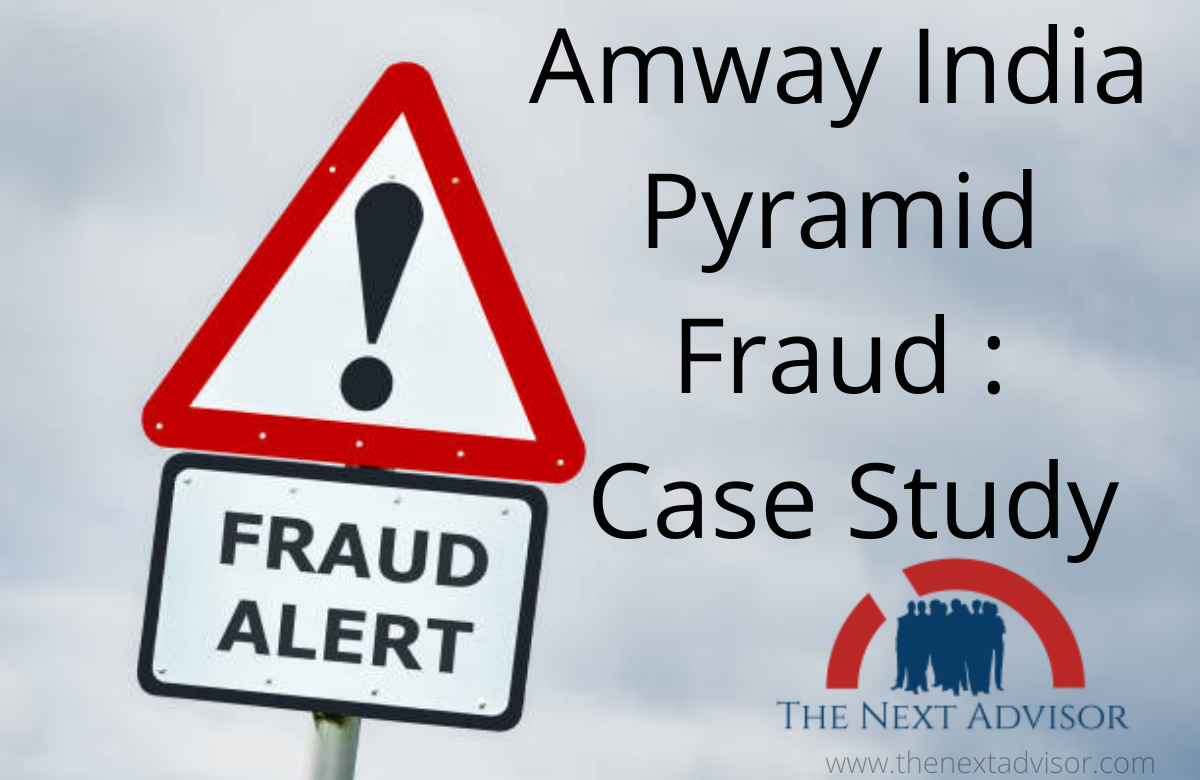Amway India Pyramid Fraud: Case Study:- What is Pyramid Scheme And Multi-Level Marketing? The Enforcement Directorate has attached assets worth over Rs. 757 crore belonging to multi-level marketing (MLM) scheme promoting company, Amway India, in a money laundering case. The central agency has accused the company of perpetrating scams by running Amway India pyramid fraud.
The agency further stated that the multi-level marketing ‘scam’ allegedly involves prices of most of the products offered by the company are “exorbitant as compared to the alternative popular products of reputed manufacturers available in the open market”. Out of the total Rs. 757.77
crore of assets attached under the Prevention of Money Laundering Act (PMLA), immovable and movable properties are worth Rs 411.83 crore while the rest are bank balances of Rs 345.94 crore kept in 36 accounts belonging to Amway, it said.
The ED has said that an investigation has revealed that Amway is “running Amway India pyramid fraud in the guise of direct selling multi-level marketing network”.
About Amway:- Founded in 1959 and based in Michigan, Amway, a US-based company, is one of the most famous multi-level marketing in India. It sells FMGC (Famst Moving Consumer Goods) products. The company uses a combination of direct selling and multi-level marketing.
What is the magnitude of the alleged Amway India Pyramid Fraud?
The ED said Amway collected Rs. 27,562, crore from its business operations from 2002-03 to 2021-22, out of which it paid a commission of Rs 7,588 crore to its distributors and members in India and the US. “The entire focus of the company is about propagating how members can become rich by becoming members. There is no focus on the products”. The ED said Amway brought Rs. 21.39 crore as share capital in India in 1996-97, and remitted Rs 2,859.10 crore until 2020-21 in the name of dividend, royalty, and other payments to investors and parent entities.
How long has Amway been under probe in India for this Amway India Pyramid Fraud? :-
Between 2006and 2014, the Andra Pradesh Police filed several cases against Amway under the Prize Chits and Money Circulation Schemes (Banning) Act, 1978 and IPC Section 420 in cities including Hyderabad, Vijayawada Kurnool, Warangal, and Khammam. The FIRs were based on complainants from Amway associates who felt cheated, lawyers and activists, who alleged Amway of running a pyramid fraud and an illegal money laundering scheme in the name of MLM. The police shut down all corporate offices associated with Amway.
First Complaint about Amway India Pyramid Fraud
One of the first complaints was filed in September 2006 by a Hyderabad- based businessman, A V S Satyanarayana, with the CID Police Station. He said two Amway distributors had approached and invited him to join the scheme by paying Rs. 4,000 and enrolling more members, and he would earn commission quickly. In August 2005, he joined by paying Rs. 5,2000. He alleged that the scheme was a chain, where each member was asked to enroll more. The CID registered this case under IPC Sections 385 and 480.
In May 2014, based on a complaint lodged at Kurnool, the AndhrasruDy O Pradesh CID arrested Amway India Chairman and CEO William S Pinckney from Gurgaon. He was subsequently taken into custody by Khammam Police too. In August 2011, Kerala Police had sealed offices of Amway at Kozhikode, Kannur, Kochi, Kottayam, Thrissur, Kollam, and Thiruvananthapuram.
In November 2012, the Economic Offences Wing of Kerala Police conducted searches at Amway offices, seized products valued at Rs 2.14 crore, and arrested some officials. On June 8, 2013, a Kozhikode court lifted the freeze on Amway offices in Kerala.
• In 2017, a Chandigarh court framed charges under IPC Section 420 and the Prize Chits and Money Circulation Scheme (Banning) Act, agaînst two directors of Amway India – Pinckney and Prithvi Raj Bijlani. This was based on a cheating case filed by eight complainants in 2002. A revision plea by the two was dismissed in 2018.
Allegations in Abroad
• On November 3, 2010, Amway announced it had agreed to pay $56 million – $34million in cash and $22 million in products – to settle a class action filed in Federal District Court in California in 2007. The class action alleged fraud, racketeering, and that the defendants operated in an illegal pyramid scheme. • A 2009 class-action case lodged in Canada was rejected by the Federal Court. Following an appeal, the Federal Court of Appeal directed the costs awarded to arbitration.
What is a pyramid scheme?
• A pyramid scheme is a sketchy and unsustainable business model, where a few top-level members recruit newer members. • Those members pay upfront costs up the chain to those who enrolled them. As newer members in turn recruit underlings of their own, a portion of the subsequent fees they receive is also kicked up the chain. Often called “pyramid scáms,” these operations are illegal in some countries,” according to the website Investopedia.
MLM vs Pyramid
• In a pyramid scheme, the major profit/comes from the recruitment fees rather than the sale of the actual products. • Multi-Level Marketing operations (MLMS) are similar to pyramid schemes with one difference: they involve the sale of tangible goods.
• The scheme often takes the shape of a pyramid, where there’s one person at the top and the number keeps increasing as more and more people are hired at the base level.



























